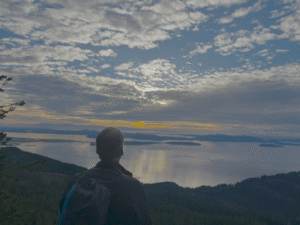Lifting our eyes to the One enthroned in the heavens: Reflections on Psalm 123
Gracie and I just returned from a month outside of the United States. In many ways it was refreshing to get out of our normal routines. While we followed the news back home fairly closely, our attention was more focussed on the people attending the spiritual retreat where we were speaking in France and the Certificate in Holistic Liberation we taught in Benin, West Africa. We also enjoyed some needed vacation.
Since our re-entry into the United States twelve days ago we’ve found it hard to not be overwhelmed by despair as it seems like during the month we were away division, hatred and apparent “success” of the dominant powers in our country have increased dramatically and seem unstoppable. Last night I felt a call to not let the apparent successes of the current Administration take up my attention, usurping the place of God. I awoke and came upon Psalm 123, which inspires me to not be overcome by political leaders, parties and the billionaires who run the the world. Rather the Psalmist inspires me to focus my attention on the Creator of the universe, the highest being who is the God of grace, and his son Jesus, the Savior of the world.
“To you I lift up my eyes, O you who are enthroned in the heavens!” I affirm with the Psalmist.
Lifting up our eyes to God involves deliberately shifting our focus from looking down or around at personal, social and global problems or political figures that inspire outrage, anger, fear or despair. .
Lifting up our eyes to the One enthroned in the heavens contrasts with looking to the president, congress, the rich and powerful, or any human being or institution. This requires not letting our media sources, (however reliable and varied) become our primary informers.
Jesus himself states clearly of himself that “the one who comes from above is above all.” In contrast, “the one who is of the earth is from the earth and speaks of the earth” (Jn. 3:31).
Being informed from above can only happen as we deliberately “keep seeking the things above, where Christ is, seated at the right hand of God.” And “set your mind on the things above, not on the things that are on earth” (Col 3:1-2).
The Psalmist here invites us to identify with (and learn from) humble, even powerless people– servants.
“Behold, as the eyes of servants look to the hand of their master, as the eyes of a female servant look to the hand of her mistress, so our eyes look to the Lord our God, until he is gracious to us” (vs. 2).
Imagining myself as a servant looking to the hand of a master requires an effort, since servants would have no one else to look to. I must choose to see myself as completely dependent on God and choose to put all my trust and hope on God being gracious to me and to those for whom I intercede. The Psalmist invites me to look to God with my physical (and spiritual) eyes as the One in the highest place, who I can be in relationship with, and from whom must wait “until he is gracious” to me.
I hear the Psalmist inviting us to follow in a complete re-orientation of our attention as the only way out of the despair or our current situation.
“Be gracious to us, O Lord, be gracious to us, for we are greatly filled with contempt. Our soul is greatly filled with the scoffing of those who are at ease, and with the contempt of the proud.”
Since returning home I can say I have personally experienced being “greatly filled with contempt,” and “filled with scoffing” in ways that are directly related to the “contempt of the proud,” which I tune into in some way nearly every day.
Here are a few examples that have especially affected me, and they directly harm people we know and love.
The current US President has used politically-charged executive orders and policies to cancel vulnerable people’s Temporary Protective Status, deport individuals to prison colonies in third countries (El Salvador, S. Sudan) to Guantanamo Bay, and more recently to allow Immigration and Customs Enforcement (ICE) to arrest brown-skinned people who fit a certain profile of an undocumented immigrant.
After the lower courts declared these orders and policies illegal, the Administration appealed to the Supreme Court (made up of a majority of Trump appointees), who then allowed Trump’s executive orders to remain in effect until there’s a hearing at a later date. Now ICE agents are stopping, arresting and interrogating and deporting people based on their racial/ethnic profile, an allowance that increases fear and insecurity among the farmworkers and other immigrants in our area and throughout the country– and despair amongst their advocates.
These cold power moves, supported by the highest courts, can make advocates who have fought hard to see laws implemented that protect society’s most vulnerable conclude that their (our) efforts are in vain, and that the rich and powerful can get away with whatever they want. This is in fact a widespread feeling linked to numerous other policy decisions the reward the rich and harm the poor that go largely unchallenged by elected officials.
The Psalmist’s remedy for despair is to invite us to direct our gaze to the highest authority, before whom we intercede– putting our total hope in the One who hears the cries of the oppressed, the groans of prisoners, and intervenes to bring liberation.
Psalm 34 powerfully invites a similar re-orientation of our attention. Check out the first eight verses.
“I will bless the Lord at all times; His praise shall continually be in my mouth. My soul will make its boast in the Lord; The humble will hear it and rejoice. O magnify the Lord with me, And let us exalt his name together. I sought the Lord, and he answered me, and delivered me from all my fears. They looked to him and were radiant, and their faces will never be ashamed. This poor man cried, and the Lord heard him and saved him out of all his troubles. The angel of the Lord encamps around those who fear him, and rescues them. O taste and see that the Lord is good; how blessed is the person who takes refuge in him!”
We recently experienced times of strengthening while offering our Certificate to 70 church leaders in Benin. In a setting marked by poverty and very minimal hope for political solutions, we were deeply impacted by the heartfelt worship and contagious joy amongst the people.
As you deliberately look to the One enthroned in the heavens, putting our trust in his grace and love, may you be strengthened and re-oriented to resist afresh– informed and empowered from above for the struggle here below.
Consider signing up for a self-paced Certificate in Holistic Liberation, which involves watching weekly videos, following a manual and meeting online on the first Monday of each month (10:00-11:30am PST) with participants from around the world (scholarships available). Check it out and sign up here.
Bob Ekblad's Blog
- Bob Ekblad's profile
- 11 followers





